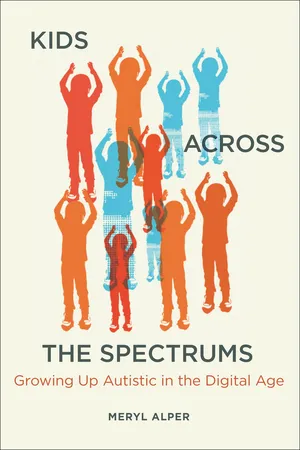
- English
- ePUB (mobile friendly)
- Available on iOS & Android
About this book
In spite of widespread assumptions that young people on the autism spectrum have a "natural" attraction to technology—a premise that leads to significant speculation about how media helps or harms them—relatively little research actually exists about their everyday tech use. In Kids Across the Spectrums, Meryl Alper fills this gap with the first book-length ethnography of the digital lives of autistic young people. Based on research with more than sixty neurodivergent children from an array of racial, ethnic, and socioeconomic backgrounds, Kids Across the Spectrums delves into three overlapping areas of their media usage: cultural belonging, social relationships, and physical embodiment.
Alper's work demonstrates that what autistic youth do with technology is not radically different from their nonautistic peers. However, significant social and health inequalities—including limited recreational programs, unsafe neighborhoods, and challenges obtaining appropriate therapeutic services—spill over into their media habits. With an emphasis on what autistic children bring to media as opposed to what they supposedly lack socially, Alper argues that their relationships do not exist outside of how communication technologies affect sociality, nor beyond the boundaries of stigmatization and society writ large. Finally, she offers practical suggestions for the education, healthcare, and technology sectors to promote equity, inclusion, access, and justice for autistic kids at home, at school, and in their communities.
Frequently asked questions
- Essential is ideal for learners and professionals who enjoy exploring a wide range of subjects. Access the Essential Library with 800,000+ trusted titles and best-sellers across business, personal growth, and the humanities. Includes unlimited reading time and Standard Read Aloud voice.
- Complete: Perfect for advanced learners and researchers needing full, unrestricted access. Unlock 1.4M+ books across hundreds of subjects, including academic and specialized titles. The Complete Plan also includes advanced features like Premium Read Aloud and Research Assistant.
Please note we cannot support devices running on iOS 13 and Android 7 or earlier. Learn more about using the app.
Information
Table of contents
- Cover
- Title Page
- Copyright Page
- Table of Contents
- Acknowledgments
- 1. Introduction
- Belonging
- Relationships
- Embodiment
- Appendix: Methods
- Index